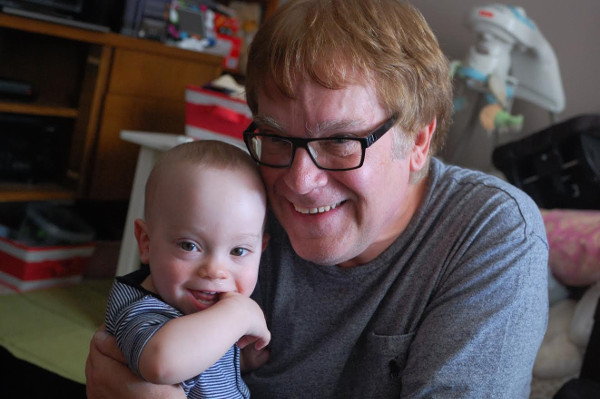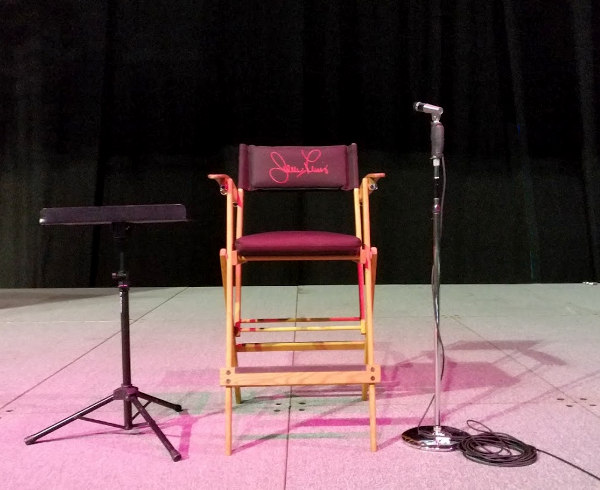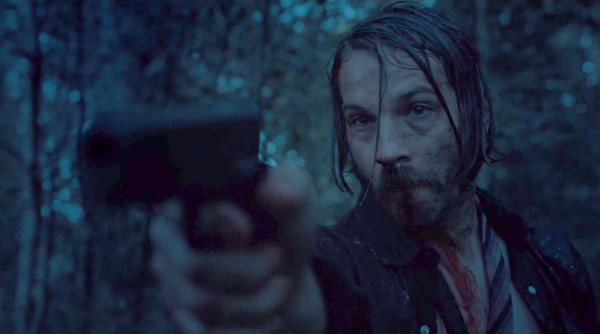Anybody who has been following my weekly updates this year, even casually, knows I’ve had “health issues.” For a guy who’s been healthy as a horse his entire life, that’s taken some getting used to.
I started to write a recap of my heart surgery and all the procedures leading up to it, but my eyes started to glaze. Let’s cut to (unfortunate phrase) something that turned up in the run-up to the previous surgery – an “infiltrate” in my lower right lung lobe. What follows is a sequel to my three-part “Heart & Soul” write-up about my heart-surgery hospitalization. There will only be one part, this time, and remember what Patty McCormack said in MOMMY’S DAY: “Don’t you know the sequel is never better than the original?”
Last Monday (Oct. 24, as I write this), Barb and I arrived at Trinity Medical Center in Rock Island at ten a.m. for my noon surgery. Barb was deposited in a waiting room where there were plenty of chairs but nonetheless she discovered that people coughing thought sitting close to her was a good idea. I was shuffled off to a space that was larger than a cubicle but smaller than a hospital room where I was required to climb into one of those your-ass-is-hanging-out robes, questioned, given an EKG and drained of some blood (Halloween coming) and subjected to the procedure I was dreading more than surgery: an IV.
The nurse supervising all this, doing much of it herself, was great. All of the nurses I would encounter on this trip were really good, several absolutely top-notch. Barb was allowed to join me at this point. My surgeon, Dr. K, came in with his easy-going bedside manner and made us feel fine, or as fine as possible. The surgery would last an hour, unless he found something he wanted to deal with on the spot, and that could take a couple of hours.
I was feeling pretty cocky. I was convinced this was nothing much, since heart-surgery patients have been through too much to be easily intimidated, and rejected the ride down the hall on my back or in a wheelchair and instead jauntily strolled down the corridor with a nurse, nodding and smiling to all we encountered, my ass hanging out, of course. It’s not my worst feature.
In the operating room, I cracked wise, putting everybody at ease, and soon I was under. When I awoke, seemingly moments later, I was in intense pain. My back felt like I was having the most intense muscular cramp I’d ever experienced. Though it’s a blur, I learned fairly soon that Dr. K had removed half of my lower right lung lobe, and that a chest tube was in, which was causing a lot of my discomfort.
That discomfort was shocking – worse than the heart surgery aftermath had been. I had not been expecting this – it was like waking to find out a truck had hit the operating room.
Before very long Barb was right there with me. She knew, when the operation went deep into a second hour, this was not what we’d expected.
Let’s get this out of the way – she is one amazing woman. She was with me all the way, right there, with support, love and sweet humor. The nurses all commented on what a great wife I have (I do not recall her being told she has a great husband…an oversight, I’m sure). She looked beautiful throughout, and several nurses who discovered we’d been married 48 years were stunned that she might be, well, as old as me.
As afternoon eased (ha!) into evening, Barb and I came to grips with the reality: what was advertised as a probable overnight stay would be at least three or four days, maybe longer (this Dr. K soon confirmed). I didn’t eat anything that first day, but the pain medication (one of those press-it-for-more buttons) did well enough. We watched MSNBC (my conservative friends will now lose all sympathy for me) because I’m a political junkie, especially election years. I had books along, but didn’t have the focus to read. I had my portable blu-ray player along, too, but just wasn’t in the mood.
Barb stayed till about nine p.m. I was coming in and out of it – I’d sleep an hour, watch TV an hour, sleep an hour. And of course medical stuff was doing on, lots of checking my vitals and tending to monitors. Here I encountered the first great nurse, Trish, who chatted with me like an old friend whenever she found me awake. She was a reader, it seemed. She wound up with a signed TARGET LANCER (she’s a Chicago girl).
The stay in the ICU was pleasant, considering, and I expressed a desire not to be moved to another floor, as is the custom on the second day. I was told there wasn’t much chance of moving me, since there were “a lot of beds ahead of me,” so I would probably be able to stay with Trish and the other nurses I’d gotten to know. Like Antonio and Maria, student nurses from Blackhawk College, whose smiles made terrific medicine.
And of course that evening I was moved to the sixth floor. Barb was unhappy. The room was small (though, incredibly, had once been a double). The TV was high, at an angle helpful to no one. One of two dim wall lights was burnt out (not on my side of the room). There was an area for a sink, but no sink. Barb described it as “Strictly Motel 8.”
Wayne, an older nurse with a Willie Nelson beard and the soothing Southern accent to with it, came along to make our stay more pleasant. He moved the bed near the working light, bitching about the lack of sink (putting us on the same team), and creating a generally welcoming atmosphere.
Along the way I came to terms with hospital food. On my previous trip, Barb had smuggled in a restaurant meal every day to off-set the horror, but I was determined not to put her through that again. I studied that menu like a professor working on a fragment of Sanskrit parchment, and learned what could be abided here – an omelette (made to order) for breakfast, with orange juice and either English muffin or bagel and cream cheese; lunch: meatloaf with gravy, mashed potatoes with gravy, green beans, slice of bread (for God’s sake not “dinner roll!”), vanilla pudding; supper: penne pasta and meat sauce, corn, bread again, pudding again. More than that I cannot help you.
By the third day I was getting worried, but the pain (though controlled by the magic button) was not letting up. I couldn’t reach for anything outside of my immediate grasp without excruciating pain kicking in. I was envisioning weeks of brutal, blubbering recovery. Nonetheless, I resumed my cocky manner and when the physical therapist, a nice young woman, came around, I disdainfully accepted the walker she offered and went up and down the hall, as well as half a flight of steps, without any other help (though the P.T. gal hovered).
Deposited back in my bed, I gave the therapist a jaunty wave and, once she left, lay in a whimpering pile.
That afternoon, however, Dr. K came around and gave Barb a detailed version of stuff he’d told me the day before, when she wasn’t around. (I’d tried to report it back to her, but it was a jumble.) His opinion was that the thing he’d removed from me wasn’t malignant, and it certainly wasn’t lung cancer. But it was possible it could be some lesser cancer, and was being shipped around the country like lost luggage. Experts would let us know in a week or two.
Then he asked Barb to leave the room and he put me on my left side and removed the chest tube. Now I’d had two chest tubes removed in the heart-surgery adventure, not fun, so I was pretty scared, and my body was no help, going into immediate spasms. But the tube came out easily, and instantly – instantly! – the pain was reduced by at least half.
That afternoon I realized I was out of the woods. I could reach for things! I felt more or less human. And Barb and I became determined that I would be home tomorrow, on the fourth day of this episode.
Through this, Barb continued to spend the days and early evenings with me, and I watched more political stuff with and without her. My sleep in the hospital always is uneven, in part because there are interruptions for taking your vitals and making you do breathing exercises; but also because it just is. Worst of all was a 4 a.m. blood draw – while there’s lots of blood in my books, I prefer it absent from my life. Anyway, I would sleep for an hour or two, read or watch something for an hour or two, rinse, repeat.
I watched two movies, neither very good, but not terrible. One was a noir called PLUNDER ROAD (1957) where a bunch of unsympathetic characters pull off a robbery and flee and, 71 minutes later, wind up dead. Okay by me. The other was YOUNG SAVAGES (1961), a juvie courtroom melodrama with Burt Lancaster as a D.A. who comes to the conclusion that maybe he shouldn’t fry three kids for a murder. It’s based on the novel A MATTER OF CONVICTION by Evan Hunter, apparently an attempt to make BLACKBOARD JUNGLE lightning strike twice (it didn’t) and not a patch on any of his Ed McBain 87th Precinct novels.
Now back when we were anticipating this hospital visit, Barb had scolded me about my choice of movies. Why didn’t I watch something good? Something great? Why subject myself to such schlock? Her opinion was that watching good movies would make me suffer less. Regular readers here may recall that I reviewed the fourteen such flicks I saw on my heart-surgery romp, and that they were only moderately less painful than the surgery.
And now I know why I do this to myself – it suddenly came to me! Why watch something really good when you’re miserable and can’t truly enjoy it? Instead, watch some mediocrity that has an element of interest to you (actor, screenwriter, director, cheesy genre) and just kill the time. Do you really want to make VERTIGO or KISS ME DEADLY a hospital memory?
Anyway, the next day I felt even better, and was cocky again, showing off for the physical therapist, rejecting the walker, walking twice as far, going up and down the stairs, a real Olympic work-out. We encountered, on our journey, a P.T. gal from the fifth floor and we had a warm reunion at the nurses’ station. Everybody was proud of me. Aware my ass was hanging out, I reminded these women where my eyes were.
Back in my room, Tessa – my main physical therapist from the fifth floor back in February – came looking for me. That meant a lot. She’s beautifully pregnant now, and I made both Barb and Tessa laugh when I denied paternity. These are the kind of inappropriate remarks you can make at my age in the hospital.
All that was left was to convince Dr. K that I was ready to be discharged. When he entered the room, I stood up so fast from the poorly designed hospital-room recliner that I almost blew it by falling down. But he only smiled, asked a few questions, and sent us on our way. In hospital terms, “being sent on your way” means you sit for three hours waiting for the paperwork to come through.
So I’m back home with the beautiful Barbara. Oddly I don’t feel as well as I did that last day in the hospital. It’s context. You feel great for the hospital. At home, you wondering, Maybe I should still be in the hospital…
I’m writing this on Sunday October 30. On Friday I did some work with Matt Clemens regarding the cover for EXECUTIVE ORDER. Yesterday I did some editorial work on the third Caleb York novel. Baby steps. Tomorrow I will see how much I can get done on a Caleb chapter.
Yes, we are waiting for a shoe to drop where the thing they cut out of me is concerned. Positivity and prayers are welcome, but we feel good. Not cocky, but good.

One week after surgery. (M.A.C., not the pumpkin.)
* * *
The final episode of the first season of QUARRY has aired. I’ll share thoughts about it next time.
Here’s an interesting review of that episode.
Here’s a remarkable overview of my work, with an emphasis on QUARRY and lots of fun pics.
Check out this terrific interview with Mike Fuller and Graham Gordy, QUARRY’s TV stepfathers.
And this one with director Greg Yaitanes.
Here’s a look at the show itself.
QUARRY is number seven on this list of the best 11 TV series of the season.
And finally check out this great take on the QUARRY series from the Washington Post.
M.A.C.



















